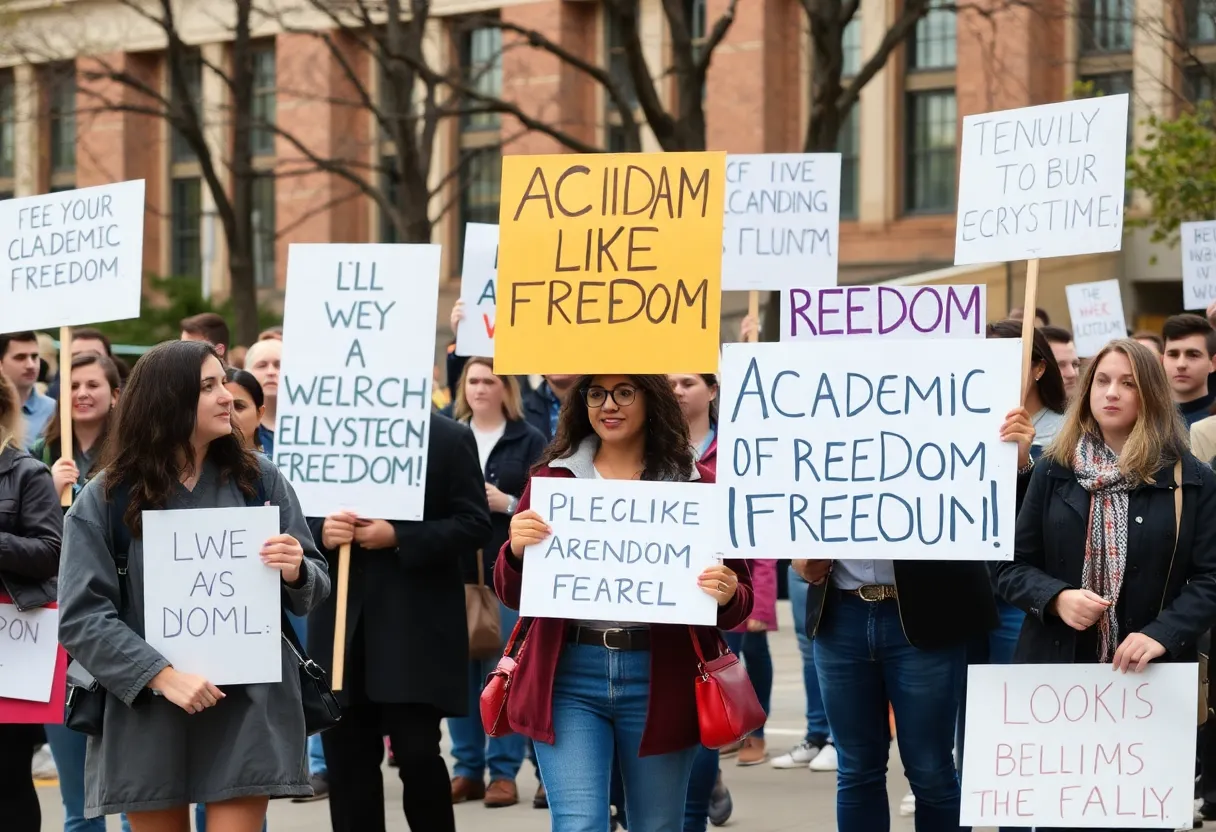Tucson, October 7, 2025
University of Arizona faculty rallied against the Trump administration’s proposed ‘academic compact’, citing potential threats to research independence and academic freedom. The protest highlighted concerns over vague demands for ideological consistency in educational programs. With a deadline of October 20 looming for feedback, faculty and student groups united to advocate for unbiased education and open debate, amidst worries about the impact on campus diversity and funding.
UA Faculty Protest Trump Administration’s ‘Academic Compact’ Threatening Research Freedom
Tucson, AZ – October 7, 2025 – University of Arizona faculty members organized a rally on campus today to oppose the Trump administration’s proposed ‘academic compact’, expressing serious concerns that it could limit free inquiry and the independence of research activities. The gathering drew professors from various academic departments who used signs and speeches to underscore the compact’s ambiguous demands for ideological consistency in educational programs.
The administration has set a tight deadline, requiring UA to provide limited feedback by October 20. Faculty representatives view this timeline as overly hasty, particularly given the potential implications for university operations. A history professor highlighted the risk to core principles of academic freedom during the event, reflecting widespread faculty sentiment.
Details of the Proposed Compact and Faculty Response
The ‘academic compact’ forms part of larger reforms aimed at higher education institutions nationwide. It requires periodic reviews of academic programs identified as promoting ‘divisive’ concepts, which opponents argue introduces undue political oversight into curriculum development and scholarly work. At the rally, participants from multiple disciplines voiced unified opposition, emphasizing how such measures might discourage open debate and innovation in classrooms and labs.
UA President Robert Robbins addressed the growing concerns in a statement, recognizing the faculty’s worries while stressing the necessity of compliance to maintain access to essential federal funding. This funding supports a significant portion of the university’s research initiatives and student programs, creating a complex balance between autonomy and financial stability.
Student organizations also participated in the protest, drawing attention to the broader effects on campus inclusivity and diversity. They argued that restrictions on academic content could hinder efforts to foster an environment where varied perspectives thrive, potentially impacting the educational experience for all students.
Background on the ‘Academic Compact’ Initiative
The push for the ‘academic compact’ stems from ongoing national debates about the role of ideology in education. Proponents see it as a way to ensure accountability and alignment with certain national priorities, but critics, including many academics, contend it represents an overreach that could politicize neutral spaces like universities. At UA, a public research institution, this proposal has sparked particular alarm due to the school’s reliance on federal grants for projects in fields ranging from sciences to humanities.
The faculty union has mobilized quickly in response, planning to compile a collective submission that challenges the compact’s main elements. This document will likely focus on protecting the university’s ability to conduct unbiased research and teach without external ideological mandates. Negotiations between UA leadership and federal officials are expected to intensify as the deadline approaches, with faculty prepared to advocate vigorously for revisions or exemptions.
Today’s rally marks the latest in a series of actions by UA’s academic community against perceived threats to institutional independence. Similar concerns have emerged at other universities, highlighting a pattern of resistance to reforms seen as infringing on academic freedom. As UA navigates this challenge, the outcome could set precedents for how public institutions balance regulatory demands with their educational missions.
The event unfolded peacefully on campus grounds, with participants emphasizing collaboration over confrontation. Organizers encouraged ongoing dialogue among students, staff, and faculty to address the compact’s implications comprehensively. With the October 20 deadline looming, all eyes are on how UA will formulate its response and whether it can safeguard its research autonomy amid these pressures.
This development underscores the tensions between federal policy and higher education, where funding ties often complicate resistance efforts. UA’s situation reflects broader struggles in maintaining the integrity of academic pursuits in an era of heightened scrutiny.
(Word count: 612)
FAQ
What is the ‘academic compact’ proposed by the Trump administration?
The ‘academic compact’ is part of broader higher education reforms that mandates reviews of programs deemed ‘divisive.’
When is the deadline for the University of Arizona to submit feedback on the ‘academic compact’?
The administration has given UA until October 20 to submit limited feedback.
What concerns did UA faculty express about the ‘academic compact’?
Faculty voiced fears it could stifle free inquiry and research independence, threatening the core of academic freedom.
How did UA President Robert Robbins respond to the faculty’s concerns?
UA President Robert Robbins acknowledged the concerns but noted the university must comply to secure federal funding.
Who else participated in the rally against the ‘academic compact’?
Student groups joined the protest, emphasizing the impact on campus diversity.
What is the faculty’s planned action regarding the ‘academic compact’?
Faculty prepare to submit a unified response opposing key provisions.
Key Features of the ‘Academic Compact’ Protest
| Feature | Description |
|---|---|
| Event Type | Rally by UA faculty against the proposed ‘academic compact’ |
| Main Concern | Stifling free inquiry and research independence |
| Deadline | October 20 for limited feedback submission | Compact Requirements | Vague demands for ideological alignment in curricula and reviews of ‘divisive’ programs |
| Participants | Professors from diverse departments and student groups |
| UA Leadership Response | Acknowledgment of concerns with emphasis on federal funding compliance |
| Planned Action | Unified faculty response opposing key provisions |
Deeper Dive: News & Info About This Topic
HERE Resources
University of Arizona Faces Federal Funding Ultimatum
University of Arizona Faces Funding Threat Over Federal Compact
University of Arizona Faces Federal Funding Ultimatum
University of Arizona Faces Funding Pressure Over Restrictive Compact




